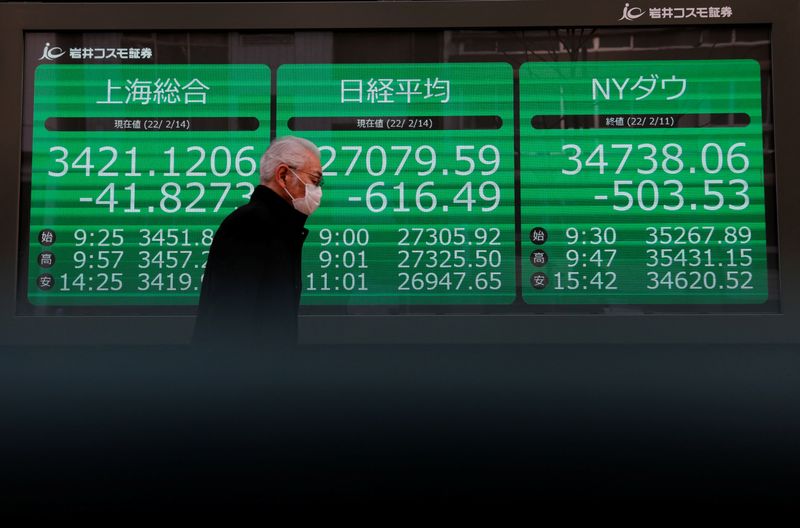By Tom Westbrook
SINGAPORE (Reuters) – Better-than-expected results at Microsoft (NASDAQ:MSFT) and Google helped steady a nervous mood in stock markets on Wednesday, while bonds and the dollar were on edge ahead of a U.S. Federal Reserve meeting that is expected to deliver another big rate hike.
Nasdaq 100 futures bounced 1.5% and S&P 500 futures were up 0.9% in Asia after Microsoft forecast strong revenue growth and Google parent Alphabet (NASDAQ:GOOGL) posted solid search engine ad sales.
Alphabet shares rose 5% after hours and Microsoft shares rose 4% to cut through some of the gloom cast by a profit warning at retailer Walmart (NYSE:WMT) and soft U.S economic data.
European futures rose 0.2% and FTSE futures rose 0.3%. Japan’s Nikkei rose 0.4%.
Things were not as bright elsewhere. MSCI’s broadest index of Asia-Pacific shares outside Japan fell 0.7%.
The world’s second-biggest chipmaker, SK Hynix, warned demand was likely to slow as customers cut spending, and shares fell 1.9%.
The euro struggled to recoup an overnight drop as a further cut in Russian gas flows loomed. The International Monetary Fund has cut global growth forecasts and in a few hours traders expect the Fed to raise interest rates sharply.
“They have laid out their plan to raise rates to restrictive levels,” said Khoon Goh, head of Asia research at ANZ Bank in Singapore. “They want to avoid a hard landing, obviously, but they just can’t take the chance of inflation staying elevated.”
The U.S. central bank is expected to announce a 75 basis point (bps) rate hike at 1800 GMT. Futures imply about a 15% chance of a 100 bps hike. The Treasury market is already anticipating that so many sharp near-term hikes will hurt longer-run growth.
Benchmark 10-year Treasury yields were steady at 2.8032% on Wednesday, below two-year yields at 3.0508%. [US/]
Australian bonds staged a relief rally on Wednesday, after consumer price data surprised on the downside for a change – even if only by a tiny margin – prompting investors to back out of bets on a 75 bps rate hike in Australia next week.
The Australian dollar fell marginally to $0.6935. Three-year bond futures rose 11 ticks. [AUD/]
EUROPE, CHINA WOBBLY
On top of worries about interest rates damaging economies, Europe faces an energy crisis and China is beset by restrictive COVID-19 policies and fresh setbacks for its ailing property market.
The euro had its worst session in a fortnight on Tuesday, sliding 1%, as Russia’s Gazprom (MCX:GAZP) said it would further cut westbound gas flow and energy prices zoomed higher – with German year-ahead prices rising to a record. [NG/EU][EL/DE]
The common currency steadied at $1.0150 in Asia. The Japanese yen held at 136.96 per dollar. [FRX/]
China’s yuan was under pressure and property stocks fell as investors have been spooked that a widening boycott of mortgage repayments on unfinished apartments and crippling debts at many developers could ricochet into the banking industry.
The onshore CSI real estate index fell 2% and a Hong Kong index of mainland developers fell more than 5%, dragged down by large developer Country Garden announcing a discounted share sale.
“China’s housing sector is in the midst of a depression and the recent mortgage boycott is a sign of the severity of the downturn,” said analysts at Societe Generale (OTC:SCGLY).
“The extent of this boycott, as it is now, is not unmanageable, but there is a risk of escalation.”
Oil prices held steady, with Brent crude futures at $104.58 a barrel and U.S. crude futures up 0.3% to $95.32 a barrel. [O/R]
Gold was steady at $1,717 an ounce. [GOL/]

Source:reuters

